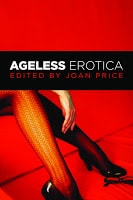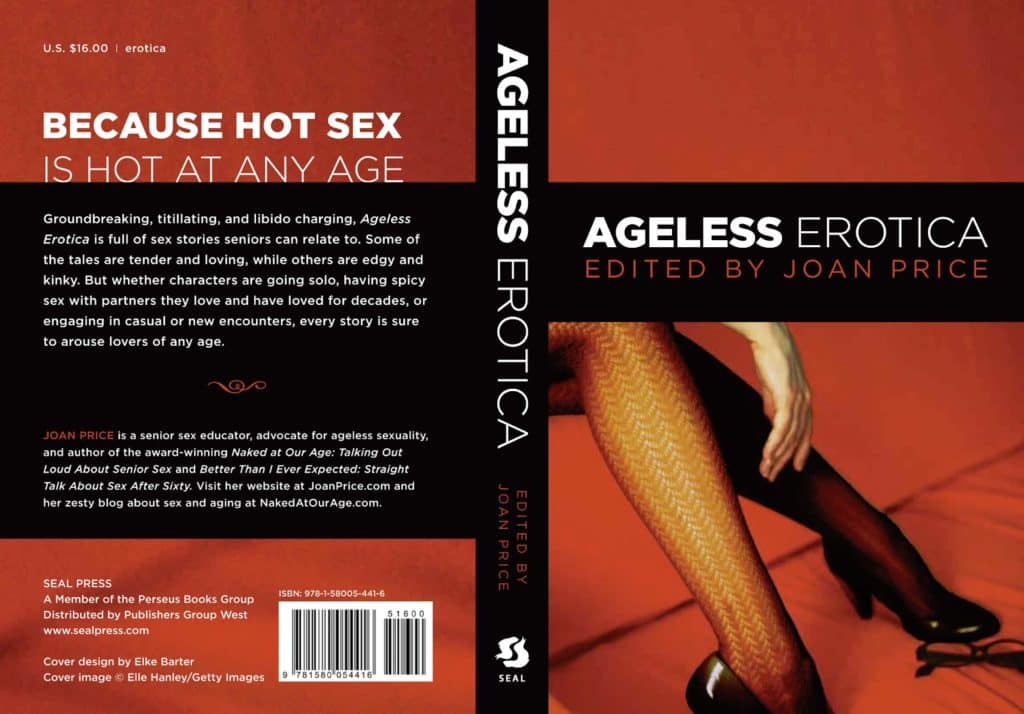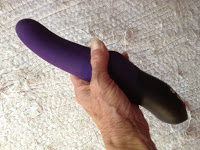“Senior Erotica”? Do we need it, want it?
 The anthology that became Ageless Erotica (Seal Press, 2013) had been a gleam in my eye for years. The older I got and the more erotica I read, the more I wished for erotica that reflected my age, my experiences, my challenges, my sexuality living in an aging body. I wanted erotica that acknowledged the challenges, the liveliness, and the creativity of older-age sex. Twenty-nine erotica writers ages 50 to 70+ came through with stories that amazed and delighted me.Do people over age 50 need or want erotica about our age group? Personally, at 69, I enjoy sexy writing, but I don’t respond to youth-focused erotica with its quick arousal and inevitable
The anthology that became Ageless Erotica (Seal Press, 2013) had been a gleam in my eye for years. The older I got and the more erotica I read, the more I wished for erotica that reflected my age, my experiences, my challenges, my sexuality living in an aging body. I wanted erotica that acknowledged the challenges, the liveliness, and the creativity of older-age sex. Twenty-nine erotica writers ages 50 to 70+ came through with stories that amazed and delighted me.Do people over age 50 need or want erotica about our age group? Personally, at 69, I enjoy sexy writing, but I don’t respond to youth-focused erotica with its quick arousal and inevitableorgasms. When I read about a couple slamming each other against a wall or onto a kitchen counter because their drive is impossibly urgent, my reaction is “ouch,” not “ohhh.” I want to identify with the characters, and I’m most stimulated by writers who write from an older perspective, using characters of our age, experiencing our challenges.Many — most? — people don’t feel this way at all. They’re aroused by characters and scenes that fill a fantasy that is unrelated to age and that takes them away from the realities of their own lives. They don’t want to be reminded of arthritic knees or undependable orgasms when they’re reading erotica.
Even among my own Ageless Erotica writers, there was no agreement when I asked them about the importance of “senior erotica.” Here’s a sampling of their comments:
- “Good erotica is never about what the characters look like. It’s about sensations, sexy thoughts, hot words, how the partners give each other pleasure,” says Donna George Storey, author of Amorous Woman, a semi-autobiographical tale of an American woman’s erotic adventures in Japan. “For me it was
deliciously naughty, a treat for my inner rebel, to write a true story about a
juicy afternoon tryst with my husband of 27 years for Ageless Erotica. That story was very, very satisfying to tell.”
- “I don’t believe we need erotica that emphasizes
the challenges of seniors — people read fiction to escape from reality,” says I.G. Frederick, who writes steamy
erotic stories and edgy, transgressive fiction. “However, all writers have a
responsibility not to marginalize older adults by ignoring them. When they
don’t appear in fiction they may succumb to the media myth that only the young
get laid.”
- “It’s important for my older characters not only to enjoy good, hot, steamy sex, but also to experience physical and emotional changes and deal with real life insecurities,” says Audrienne Roberts Womack, who also writes under the name Lotus Falcon, author of Sugar Dish Mouth Watering Erotic Poetry. “My main objective for writing erotic scenes for older characters is to emphasize that seniors are having and loving sexual relations just as they have always enjoyed it in their youth.”
- “America and the world at large are obsessed with youth and beauty being paramount to sex appeal,” says Cheri Crystal, an award-winning erotica writer whose Help Wanted: Clitoris Missing In Action features a woman turning 60. “This preoccupation with staying young often affects how we feel about our sexual selves as we age. We want and need to see ourselves in fiction, particularly, erotica, because it makes us feel good no matter how old or how many limitations and challenges we may have.”
- “Erotica from an older perspective is
fascinating because within us are the memories of a lifetime: adolescent lust,
young adult passions, the settled sexuality of middle age, and the difficulties
and rewards of older age sex,” says Susan St. Aubin, whose A Love Drive-By includes erotic
tales about people of all ages. “At almost 70, I run into more physical
limitations, but my interior fantasies remain the same, and the erotic memories
continue to grow!” - “When I write erotica, I’m focused on the erotic
aspects of lovemaking so that age doesn’t really factor into it,” says Rae Padilla
Francoeur, author of the erotic memoir, Free Fall: A Late-in-Life Memoir (read my review here).
“When we do it, we’re not just thinking, hey, watch out for my bad knee. We’re
hardly thinking at all.” Francoeur shares her writing with her lover, age 73,
on date night. “If he says, ‘This is hot,’ I’ve done my job and I’m about to
reap the rewards.”
preferences. But we can make it a trend just by buying, reading, and talking about erotica that
acknowledges our age group.
what is possible at our age!
Adult Sex Ed Month: HuffingtonPostLive, AASECT conference, and a new senior sex book
 June has been declared Adult Sex Ed Month (#AdultSexEdMonth) by Ms. Quote
June has been declared Adult Sex Ed Month (#AdultSexEdMonth) by Ms. Quote(@GoodDirtyWoman on Twitter) who blogs at A Good Woman’s Dirty Mind. This idea caught on, and this month, hundreds of posts designated #AdultSexEdMonth from sex educators and bloggers appeared all over the Internet. View the list with links here.
In my world — advocating for senior sex and educating about older-age sexuality — every month is Adult Sex Ed Month. This month has been particularly fruitful.
This month, I participated in a Huffington Post Live event titled “How Old Is Too Old To Have Sex?” with fellow panelists Ashton Applewhite, Walker Thornton, Sidney Schwab, and Ken Solin, hosted by Abby Huntsman. Of course the answer to the question in the title is obvious to us (though not obvious to Abby, until we raised her consciousness), but you’ll find the discussion interesting even though you know the answer! Watch it here:
***

The annual conference of the American Association of Sexuality Educators, Counselors
and Therapists conference always makes my brain swell with new information and ideas from sex educators who are trailblazers in the field. Counselors, therapists, sex educators in community or medical settings, and other people who care about your sexual knowledge and enrichment gather to learn from the leaders. Then people like me come home and spread it around – to people like you.
As always, it was impossible to attend all the sessions of interest, and there’s no way I can share all of the 25 pages of single-spaced notes that I took on my laptop, no matter how many blog posts I write. But here are some highlights and tips that are especially relevant to our age group:
- Some sexual issues are psychological; some are medical or physiological. But even when it’s a medical issue, a sex therapist can be important to help you work with whatever is going on. Medical sexual issues affect your sense of self and your relationship. “Any pharmacotherapy for sexual dysfunction should occur within the context of sex and relationship therapy.” (Ricky Siegel)
- One more good reason to quit smoking: Nicotine has been shown to decrease blood flow to the penis and increase venous outflow from the penis — in other words, less ability to get and maintain an erection. (Ricky and Larry Siegel)
- Women with vulvar or vaginal pain have a difficult time getting the pain diagnosed and treated effectively. Possible causes of pelvic pain are varied, and with the wrong diagnosis (or no diagnosis!), the wrong treatment follows. Look for a three-pronged approach: a sexual medicine physician, a pelvic floor physical therapist, and a certified sex therapist, such as used by the Summa Center for Sexual Health in Akron, Ohio. (Kimberly Resnick Anderson)
- Pelvic floor physical therapists are trained to do internal evaluation of the pelvic floor muscles — evaluating muscle function, strength, tone, and any points of tenderness. Regular physical therapists are not trained to do this. (Amy Senn)
- Men with low libido: Anxiety, mood, relationship, and religious factors affects libido. “First know what’s going on in the relationship before throwing medication at it.” (Larry Siegel)
- “Nerve sparing” prostate surgery is “a bit of a misnomer.” Erectile nerves on the outside of the prostate are very difficult to see and avoid during surgery. “The prostate is deep in the pelvis, and they go pushing around with stainless steel instruments. If cauterizing instruments are anywhere near nerves, it damages them for life. Nerves recover from the pushing and pulling – it takes a long, long time. Nerves go into shock and stop sending message to blood vessels to relax and let blood in.” (Anne Katz)
- “Sexual arousal requires healthy blood flow for everything else to work. Otherwise, nothing happens. Take a 15 minute walk with your partner before sex. It will prime the pump.” (Ellen Barnard)
- After treatment for female genital cancer, using a vibrating wand internally will reduce scar tissue. “Vibration directly to the scar tissue starts breaking up that scar tissue, allowing it to expand, become more comfortable, and allow penetrative sex if we want it.” (Ellen Barnard)
- After cancer treatment, start getting to know “what is”: “What feels good? What doesn’t feel good? What’s numb? What’s painful? How does arousal happen? What does it take? How does orgasm happen and feel? When during the day do I have energy?” (Ellen Barnard) You need to learn this for yourself before you can teach your partner. (JP: This applies to aging in general, also.) A Woman’s Touch has excellent educational brochures for both men and women online at no cost, for example, Healthy Sexuality After Cancer. Visit www.sexualityresources.com, see the Educational Brochures link in the upper left hand corner of the menu bar for a complete selection.
The huge news this month for me as a senior sex educator was an invitation from Cleis Press to write a book for them: The Ultimate Guide to Sex after Fifty! I’m thrilled to have a new book to write on my favorite topic, and I’m proud to be part of the fabulous Ultimate Guide collection of sexuality guidebooks. You can be sure you’ll hear more about my new endeavor as it unfolds.
Meanwhile, if there’s a topic you want to be sure that I cover in this new book, please either post it as a comment here or email me. I love to hear from you. I’m too busy to promise to answer all your questions in detail, but I try to acknowledge your email and point you in the right direction. I admit sheepishly that I have about 400 unanswered emails waiting. If one of these is yours, I thank you for your patience! (I do give private, educational consultations answering your questions by phone or Skype for a modest fee — email me for more info about this.)
Stronic Eins: Amazing
 [Sorry, this model is no longer available. See similar Fun Factory alternatives.]
[Sorry, this model is no longer available. See similar Fun Factory alternatives.]
The Fun Factory‘s Stronic Eins from Good Vibrations is unlike any sex toy I’ve ever seen/ used/ reviewed. It doesn’t vibrate exactly — it moves back and forth. It pulsates. It thrusts (gently — don’t expect a jackhammer).
If you shake it while it’s turned off, you’ll feel a solid weight inside that moves around inside the toy. When turned on, the motor moves the weight which makes the whole thing pulsate in different rhythms, depending on the pattern you choose. Quite remarkable — and wonderful, if you like a gentle thrusting motion in your vagina.
Yes, it really does move like this animation. All by itself. You just insert it, angle it to reach your G-spot, and let it work its magic. You barely have to touch it to keep it where you want it, so although you’ll see your whole arm pulsating strangely as you hold it in place using a high setting, you won’t feel stress in arthritic joints. At least I didn’t.
Here’s why you’re likely to love it:
- It moves in and out. In and out. In and out.
- It’s rumbly and throbby rather than buzzy.
- It has 10 different patterns and intensities, from dance rhythms (“rumba,” “samba,” “Viennese waltz”) to the strangely named “rattle,” “gallop,” “dirty dancing,” and “roller ball.” The controls are easy to find and use — no reading glasses required. (I can’t say that about the minuscule font in the instruction booklet, however.)
- It’s body-safe silicone — and waterproof.
- It’s rechargeable with a magnetic plug, so no batteries or cords to worry about while you’re using it. It holds a charge for a long time.
- It’s super quiet.
Here’s why you might think twice:
- If you like a slender toy, this may push your limits, as it does mine. It starts at 1.25″, gets to 1.5″ quickly, then widens to 1.75″ at the girthiest point. That would have been too big for comfort, but it was irrelevant — it got to my G-spot at the 1.5″ width. The rest of it just became a handle.
- The bump is supposed to be a clitoral stimulator. It never got close enough to touch my clitoris — too wide at that point for me. (That didn’t matter to me, because, frankly, I was using a different clitoral vibrator at the same time. Yep, teamwork.)
- You may feel the drag of the matte silicone. Use plenty of water-based (not silicone) lubricant.
- It’s expensive.
“Stronic Eins”? I don’t know why a toy this wonderful has such an odd name (does it mean something in German?), but you can rename yours. “OMG.” “Darling.” “Houdini.” “Santa Claus.” “Robert Redford.” You’ll think of something appropriate.
Seriously, what might deter you is the $199 price tag. Yow. I’ll say it’s worth it, but I also have to admit that I didn’t pay for mine — the good folks at Good Vibrations responded to my request to review it. Thank you, GoodVibes — I love my Stronic Eins.
I wonder why a $199 toy doesn’t come with a storage pouch. It needs one, because it picks up every piece of lint, dust, and cat hair in the room.
Please Note: Because the Stronic Eins technology uses magnets, it should not be used by or with anyone with a pacemaker.
Widows and Widowers: Should we just date each other?
“I think I could only date a widower — only someone who has gone through this could understand,” I told a buddy when I thought I might be ready to start dating after losing my beloved Robert.
I put my preference for widowers prominently in my online dating profile. I later changed that, or at least softened it to “bonus points,” just because it narrowed the possibilities too much. But it remains my preference. Here’s why:
- When they are talking with animation and suddenly sink into silence and sadness, I understand.
- When they bring up anecdotes about their wives, I get it.
- When they slip into present tense talking about their spouse, then correct themselves, I remember how often I’ve done that.
- When they talk vulnerably about their grief, I know I can do that, too.
- When they laugh and talk about their future changes they want to make in their lives, I know what it took to get to that point.
How long does it take to be ready to date? I don’t know. We’re all different. Don’t judge us if we think we’re ready, then realize we’re not. We’re not grieving for a time, then suddenly done with grief — it’s a spiral: we cycle in and out of grief. We can feel that we’re truly ready to date, and then we’re struck down by missing our beloved powerfully.
And if you date a widow or widower, please don’t worry that you’re in competition with his or her perfect spouse. You’re not in competition with our memories. Understand that there will always be that layer of memories and love, and accept that part of us. It shows that we know how to love.
Recently, I’ve had a couple of dates with two different widowers. I love the conversation, how easily we slip in and out of past and present, how we acknowledge the fear and the reluctance to date again — and how we realize that our growth depends on learning how to do that. Maybe we should just date each other.
What do you think? Your comments are welcome, especially if you are widowed or are dating a widow or widower.
[Thank you, Sienna Jai Fein, for the post “Widower: What If He’s Not Ready To Date?” on Dating Senior Men, which led me to ruminate on this topic.]







